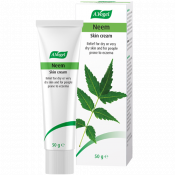Did you know?
In some circumstances you can calm your eczema symptoms by making small amendments to your diet?
Change your diet to help control eczemaThere has been some exciting but mixed research on using probiotics to treat eczema. In this article, I look at the role probiotics may play and the link between gut health and the skin. I also give alternate suggestions that may improve eczema and support the digestive system.
Research shows that probiotics may be able to reduce the symptom severity and inhibit the development of allergic conditions such as eczema. However, while there is a clear association between an imbalance in gut bacteria (dysbiosis) and eczema, experts have argued that the evidence is mixed and that more research is needed.
It shouldn't surprise anyone to learn that a skin condition like eczema is complicated. External factors such as harsh soaps and cold windy weather can play havoc with the skin; plus, there are usually a number of underlying factors, such as dysbiosis, that can vary from person to person.
Dysbiosis is fascinating - the microscopic organisms (that exist everywhere) can be different in the guts and on the skin of people with eczema. In other words, there may be fewer of a variety of friendly bacteria in (and on) people with eczema and larger numbers of microorganisms that are not beneficial. I've written more about this and the gut-skin axis in my article Is eczema linked to gut health? This has prompted scientists to study 'good' bacteria (probiotics), to test whether introducing them can help rebalance the gut and reduce eczema symptoms.
The reason scientists think that probiotics show promise as a treatment for eczema is because 70% of our immune cells line the intestines and interact with the gut microbiome. Certain strains of bacteria have been shown to have a regulating effect on immune cells (such as T cells) and have the potential to calm inflammation affecting the skin.
Good bacteria also act as a defence in the gut by forming a layer of mucosa covering the walls of the intestines. This is like a living protective balm. Dysbiosis can damage the protective barrier and compromise the gut wall, and this is associated with the development of allergies and eczema.
Some of the clinical trials and research have shown promising results. One study on pregnant women and their infants found that supplementing in the last month of pregnancy and for the first six months of the infant's life significantly reduced the chances of developing eczema(1). A small Italian trial concluded that a specific strain of bacteria improved itch and quality of life(2).
However, there has been controversy. Experts who have gathered together and reviewed many of the probiotic clinical trials and studies have come to the conclusion that more research is needed(3). Studies have been small and done on a bewildering variety of bacteria. There have been too many inconsistencies in results with no clear indication on how much to take and for how long. The overall conclusion suggests that is that it's too early to say for sure if probiotics have proven benefits for eczema.
There is a proven link between the gut microbiome (microorganisms) and skin inflammation, so it makes good common sense to focus on digestion when supporting eczema. There are many good brands of probiotics, such as Optibac, that may be worth trying. There are also lots of different ways of positively influencing the balance of good bacteria in the gut.
One type of bacterium called Staphylococcus aureus is found in greater numbers on the skin of people with eczema(5). This is interesting information and some researchers have wondered if this bacteria is there in greater numbers because the skin barrier function is weak - might they have been attracted to drier skin? OR, are the microbes on the skin weakening the skin barrier function?
Either way, it's sensible to protect the skin from drying out, as this will create a stronger skin barrier function that will help prevent allergens and unfriendly microbes from causing and worsening flare-ups. I like to use natural moisturisers that avoid the use of artificial preservatives and synthetic ingredients. Keep your eyes out for creams that contain active botanicals that have a long traditional use in the treatment of skin inflammation and eczema:

"Brilliant for itchy irritated skin"

In some circumstances you can calm your eczema symptoms by making small amendments to your diet?
Change your diet to help control eczemaDiscover the story of Alfred VogelNature is just about the best thing we’ve got!